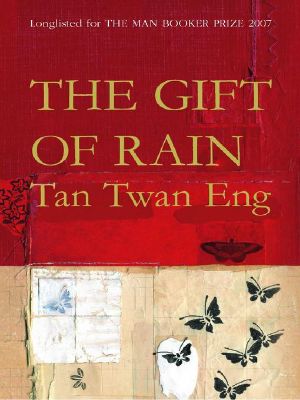The Gift of Rain

- Authors
- Eng, Tan Twan
- Publisher
- Myrmidon Books
- Tags
- literature , retail , world literature , malaysia
- ISBN
- 9781602860742
- Date
- 2007-01-09
- Size
- 0.40 MB
- Lang
- en
From Publishers WeeklyStarred Review. This remarkable debut saga of intrigue and akido flashes back to a darkly opulent WWII-era Malaya. Phillip Hutton, 72, lives in serene Penang comfort, occasionally training students as an akido master teacher of teachers. A visit from Michiko Murakami sends him spiraling back into his past, where he grows up the alienated half-British, half-Chinese son of a wealthy Penang trader in the years before WWII. When Hutton's father and three siblings leave him to run the family company one summer, he befriends a mysterious Japanese neighbor named Mr. Endo. Japan is on the opposing side of the coming war, but Endo paradoxically opts to train Hutton in the ways of aikido, in what both men come to see as the fulfillment of a prophecy that has haunted them for several lifetimes. When the Japanese army invades Malaya, chaos reigns, and Phillip makes a secret, very profitable deal. He cannot, however, offset the costs of his friendship with Endo. Eng's characters are as deep and troubled as the time in which the story takes place, and he draws on a rich palette to create a sprawling portrait of a lesser explored corner of the war. Hutton's first-person narration is measured, believable and enthralling. (May) Copyright © Reed Business Information, a division of Reed Elsevier Inc. All rights reserved.
From The New YorkerSet in Penang in the years just before and during the Second World War, this début novel explores the consequences of love and duty. Philip Hutton, born to a British father and a Chinese mother, finds himself drawn to a mysterious Japanese diplomat and aikido master, and soon becomes his devoted student. But their friendship—described in romantic, even erotic terms—is called into question when the Japanese invade the island and Philip must decide whether to join the resistance or collaborate with the occupying army. The wartime narrative is gripping, but Eng’s story suffers from stilted dialogue, which is often pressed into service for historical exposition, and overwrought fight scenes. More profoundly, the narrative’s gestures toward mythology and a philosophy of reincarnation feel like a distraction from the more compelling concerns of loyalty and loss.Copyright © 2008 _ Click here to subscribe to The New Yorker_